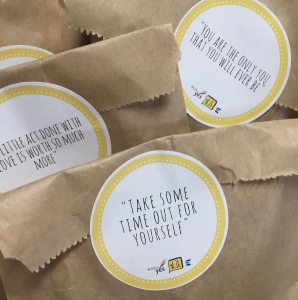WelCom October 2016:
Manaakitia te Ira Tangata 9 o Oketopa 2016
Every life is worth living | Kia puawai te katoa o ngā ira tangata
‘This is my commandment: love one another as I have loved you.’ John 15:12
‘Ko taku ture tenei, kia aroha koutou tetahi ki tetahi, me ahau hoki kua aroha nei ki a koutou.’ Hoani 15:12
Respect Life Sunday, 9 October, observed in Catholic dioceses in New Zealand, is about reflecting on the value and dignity of human life throughout its natural cycle. The month of October is dedicated to increasing a greater culture of life through areas of pastoral care, and prayer.
Often, as a society and as individuals, we identify ourselves by what we do – not who we are. We base our worth on how productive we are at work or at home, and we determine our lives to be more or less good depending on a degree of independence or pleasure. We may even to believe that if our lives, or those of others, don’t ‘measure up’ to a certain standard, they are somehow less valuable or less worth living. Respect Life Month is a fitting time to reflect on the truth of who we are within our own identity as created in God’s image.
‘Even the weakest and most vulnerable, the sick, the old, the unborn and the poor, are masterpieces of God’s creation, made in his own image, destined to live forever, and deserving of the utmost reverence and respect.’ – Pope Francis
Luke Chapter 14: 13, 14, 21, 23-27
13 ‘…When you have a party, invite the poor, the crippled, the lame, the blind;
14 then you will be blessed, for they have no means to repay you and so you will be repaid when the upright rise again.’
21 ‘… The householder … said to his servant, “Go out quickly into the streets and alleys of the town and bring in here the poor, the crippled, the blind and the lame.”
23 …“Go to the open roads and the hedgerows and press people to come in, to make sure my house is full;
24 because, I tell you, not one of those who were invited shall have a taste of my banquet.” ’
25 Great crowds accompanied him on his way and he turned and spoke to them.
26 ‘Anyone who comes to me without hating father, mother, wife, children, brothers, sisters, yes and his own life too, cannot be my disciple.
27 No one who does not carry his cross and come after me can be my disciple.’
Never Judge a Book by its Cover – A Mother’s Story
Helena McNeill
Have you heard the saying ‘never judge a book by its cover’?
Well, I think that’s what happens when we hear the word ‘disability’. People get a certain picture in their head – bland, awful, disturbing, pity – and think they know what it’s all about.
But we all know that the book Gone with the Wind is not a story about the weather!
In the same way, the words ‘disability’ or ‘special needs child’ is not a tragic story about wheelchairs, supportive equipment, therapists, diagnosis and medical issues; it can involve all those things, but that is NOT what the story is about!
If you look beyond the wheelchair, equipment, the differences, the mess, the stress – when you get up close; you discover it is A LOVE STORY.
I’m not talking about a Disneyland-Hollywood kind of love; but a deeper, fiercer, tougher love – a sacrificial, crazy kind of love that makes you walk away from your dream job and move countries.
It’s a love that many won’t recognise.
A love that comes with a high price tag.
And it’s a love that messes with you.
And when you are in this love story, you get used to doing life with a lump in your throat, and finding tears stinging your eyes all of a sudden in the most mundane moments.
That love story crashed into my life 11 years ago, with the birth of my twin girls, Jazmine and Sunshine. They were born three months early, and Sunshine paid a high price to survive – she has severe cerebral palsy and is profoundly deaf. She can hear us today thanks to the miracle of a cochlear implant, but needs full-time care 24/7. She also knows how to love and has a smile that will rock your world.
For a long time after the diagnosis I felt crushed, completely smashed.
I thought life was over, but it wasn’t; it was just going to be very different.
That’s what it is – a different journey. A new normal. Our family lives and moves to a different rhythm. It has limitations. There is more work in our daily routine. Truth is it can be exhausting: physically, mentally and emotionally. And spiritually? I can’t even begin to tell you the mysterious journey disability takes your faith on.
But having Sunny in my life means I get a front row seat to something holy.
My day always ends the same. Every night I give Sunny a final goodnight kiss and pause to soak up the beauty…those adorable chubby cheeks, the long lashes, her blonde curls…I don’t know how to explain it, but it is holy ground. It rips open my heart in such a bittersweet way. Even though it can be so incredibly heartbreaking, I wouldn’t want to live without that girl and her smile.
And in that moment I see something…something beyond the surface. And I feel I can hear God whisper ‘See! The greatest is love.’
That’s the story that needs to be told about disability.
To see the holiness, see Jesus, see the image of God, see the transformation that it can bring into our lives.
It’s a story about a family, a mother, a father, a sibling, living out a messy, complicated, heartbreakingly-beautiful love story.
It’s not telling us about how much can go wrong; it’s telling us how much love there can be when everything appears to be going wrong.
It’s the story that gives dignity and honour to people with a disability and their families, seeing them as the most cherished people in our churches and communities.
I’m hoping one day it will be a best seller…
Singer, songwriter and musician Helena McNeil and her husband Jae live in Melbourne with their twin daughters Jazmine and Sunshine (www.helenamcneill.com).
Pope highlights sanctity of life in Year of Mercy visits
Pope Francis donned a green hospital gown over his white cassock and entered the neonatal unit of a Rome hospital, peering in the incubators, making the sign of the cross and encouraging worried parents.
The trip to the babies’ ward of Rome’s San Giovanni Hospital and then to a hospice on 16 September were part of a series of Mercy Friday activities Pope Francis has been doing once a month during the Year of Mercy.
By visiting the ailing newborns and the dying on the same day, the Vatican said Pope Francis ‘wanted to give a strong sign of the importance of life from its first moment to its natural end.
‘Welcoming life and guaranteeing its dignity at every moment of its development is a teaching Pope Francis has underlined many times.’ With the September visits Francis wanted to put ‘a concrete and tangible seal’ on his teaching that living a life of mercy means giving special attention to those in the most precarious situations.
During the Mercy Friday visits, Pope Francis has spent time with migrants, the aged, at a recovery community for former drug addicts and at a shelter for women rescued from human trafficking and prostitution.
Pope Francis stopped by the emergency room of San Giovanni Hospital before going to the neonatal unit, where 12 little patients were being treated. Five of the newborns, including a pair of twins, were in intensive care and were intubated. The pope also went to the maternity ward and nursery upstairs, greeting new parents and holding their ‘bundles of joy’.
Leaving the hospital, he drove across town to the Villa Speranza hospice, which hosts 30 terminally ill patients. The hospice is connected to Rome’s Gemelli Hospital.
Pope Francis went into each of the rooms and greeted each patient to the great surprise and joy of the patients and relatives.
Source: Vatican City (CNS)
ASA allows Voice For Life advertisement
The Advertising Standards Authority Complaints Board has ruled there are no grounds for a complaint against a Voice for Life advert to proceed. In May, full-page advertisements ran in main newspapers, to mark 500,000 abortions performed since 1974. The wording said, ‘What if 500,000 Kiwis just disappeared? Could we have saved them?’ Voice for Life’s national president Bernard Moran welcomed the ruling in September. ‘…We wanted New Zealanders to be aware of this milestone of 500,000 abortions and what it represents for our ageing society. But at the same we suggested a positive and humane way forward – the promotion of open adoption.’
Breakthrough in Monitoring Fertility
Mary-Ann Bailey
Did you know that couples are not able to conceive for 80 per cent of the time during a women’s monthly cycle. Therefore, throughout her childbearing years a woman is potentially fertile for only 20 per cent of each cycle.
Couples wanting to plan a family will soon be able to assess and predict a woman’s natural fertile and infertile times each month with a level of confidence and accuracy not previously seen in medicine.
The Health and Fertility Foundation, based in Palmerston North and with the support of the Catholic Diocese of Palmerston North, has developed a new home device called the ‘Fertility Meter’. It uses a natural method that involves no drugs, hormones or chemicals and which women planning pregnancy can easily use to accurately assess their own fertility.
The science behind the new device supports natural methods of family planning and is in keeping with the Catholic Church’s and Pope Francis’ teaching on respecting ourselves and our environment.
The method involves an advanced technology in urine testing, which within 12 hours of use gives a woman accurate readings and indications of her fertility cycle.
Retired Dr of Chemistry Len Blackwell and his team at Massey University have been working for a number of years to test and evaluate hormones that determine the fertile cycle. While a home device called the ‘Ovarian Monitor’ has been developed and in use for some time, the team’s development of the new Fertility Meter will enable women to predict their fertile days within each cycle to a much greater level accuracy than before.
The Foundation is now in the process of raising funding support to bring this new product to the New Zealand and international markets within the next two years including the United States and to homes worldwide. They want to enable women everywhere to have ready access to this breakthrough method.
The Health and Fertility Foundation was established in 1992 and launched on the steps of the Cathedral of the Holy Spirit by Professor Len Blackwell, Charles Andrew, a lawyer, Brian Smith, John Crowley, an obstetrician, and Anne Richards, a previous national Christian Family Life Educator.
The foundation was created to support the further development of over 60 years of fertility research conducted by Professor Len Blackwell at Massey University and Professor James Brown of the University of Melbourne. The Trust is committed to helping women worldwide to make informed choices around their fertility in a way that doesn’t involve drugs or invasive methods of controlling fertility, and which is affordable.
Visit www.healthandfertility.org to learn more about the Foundation and the Fertility Monitor or to support its work through
a donation.
Mary-Ann Bailey is a Health and Fertility Foundation member. She is a trained Christian Family Life Educator, is on the staff at St Peter’s College Palmerston North, and is a parishioner at the Cathedral of the Holy Spirit.
Positive ‘Small Talk’ Thoughts
Maria Helbano, St Mary’s College student
 A group of Wellington’s St Mary’s College students took part in the Young Enterprise Scheme 2016 to make a difference to people’s lives through their Small Talk business.
A group of Wellington’s St Mary’s College students took part in the Young Enterprise Scheme 2016 to make a difference to people’s lives through their Small Talk business.
Their simple product aims to counter silence around depression. When they read one in five New Zealanders is affected by depression at some point in their life, they felt inspired act.
To make people’s lives a little brighter, the group has produced a series of stickers with 24 positive affirmations for use on coffee-cup lids, food items, or gifts at point of sale.
 Small Talk’s Emily Jenner says, ‘We want these affirmations to help people smile in
Small Talk’s Emily Jenner says, ‘We want these affirmations to help people smile in
the morning.’
The stickers are in cafes in Wellington and other parts of New Zealand. ‘The number of people who have reached out to us and the publicity we have received has been overwhelming,’ says Georgia Trass.
As St Mary’s College students who live Catholic and Mercy values the team is especially invested in trying to decrease depression. ‘All life has value and each person has a story to tell. If our stickers can affect even one person through a smile, it can ripple to many others. No act of kindness is ever wasted.’ (www.smalltalk.org.nz).
A Place for all Ages
We must reawaken the collective sense of gratitude, of appreciation, of hospitality, which makes the elderly feel like a living part of the community. Pope Francis
In September the Australian Catholic Bishops Conference launched their Social Justice Statement for 2016‒2017, titled A Place at the Table: Social justice in an ageing society. The findings, recommendations and prayers are applicable to life in Aotearoa New Zealand.
The statement celebrates the value, dignity and significant contributions of older people to the life of the community. In solidarity with all generations, older people have a rightful place in the heart of community life.
It challenges us to recognise older people’s significant contribution to society and emphasises this should not be valued in mere economic terms. It calls for justice for those who are most vulnerable and warns about a view of older people as burdensome or dispensable.
The number of Australians aged 65 and over will more than double by the middle of the century. Increasing numbers of older people have an excellent chance of enjoying good health and an active life for many years, but society is ill-prepared for this demographic change.
The bishops warn of the loneliness, ageism and abuse that older people can experience and, in particular, they warn about implications of the current debate on euthanasia. They call for communities of mercy and love – where people reach out and minister to vulnerable older people, where bonds between generations are built up, and where no one is cast as being a burden or as rivals to younger generations.
You can read the statement online (www.socialjustice.catholic.org.au).
All lives matter
Wendi Wicks
On Tuesday 25 July, at Tsukui Yamayuri En, west of Tokyo, 19 disabled people were stabbed to death as they slept in a residential facility. A former employee killed 10 men and nine women and injured 24 others, then handed himself in to the police.
He said it was better ‘that disabled people disappear’ – he had already put this in a letter to the speaker of the Japanese parliament, writing that ‘the disabled can only create misery’. His ‘plot’, for Prime Ministerial agreement, was that he would wipe out 260 people, be arrested and imprisoned for only two years with a new identity and plastic surgery thereafter.
We might have anticipated similar reactions to those that happened after the recent multiple killings in Paris, Nice and Orlando. There, one saw huge media coverage with repeated updates and well-attended memorials and vigils. But for this tragedy, no mass-media response – no public outrage, no vigils. Nothing! Disabled people know because we looked.
However, disabled people worldwide reacted with a storm of comment, horror and action. New Zealand disabled people led off with a vigil. Protests, memorial services and marches followed worldwide.
Disabled people mourned, and it was devastating to hear the murdered people in Japan would not be named because their families were ashamed to acknowledge a disabled relative. This erasing of disabled people from the public record continues our invisibility.
Sadly, what happened in Japan is symptomatic of the everyday disability invisibility everywhere, including New Zealand. Society sees disabled people as not fully human. So names, or identities, seemingly don’t matter. It seems it is understandable to abuse, even kill or euthanase ‘them’.
The message here is the opposite of ‘all lives matter’. In the media and in the public mind, our lives don’t seem to matter; badly-informed ideas of how disabled people live are seen as a good reason for our death.
We know the negative consequences of such attitudes well. Disability is always cast in fear-derived negative terms. One is ‘better dead than disabled’, notably if one needs assistance with bathing, toileting, or feeding (thereby losing dignity). Disabled lives are discounted – we feel a burden.
While such inimical attitudes exist, disabled people are at risk of the extermination the Japanese knifeman advocated for, should New Zealand ever allow assisted suicide. Overseas evidence makes clear that safeguards and criteria cannot be made robust – to offer assisted suicide legislation in this context would be harmful to the point of death. Disabled people – and we are 24 per cent of the population – deserve much better.
Wendi Wicks is a celebrant, writer and strong advocate for disability rights. She convenes ‘Not Dead Yet Aotearoa’ (notdeadyet.org).

